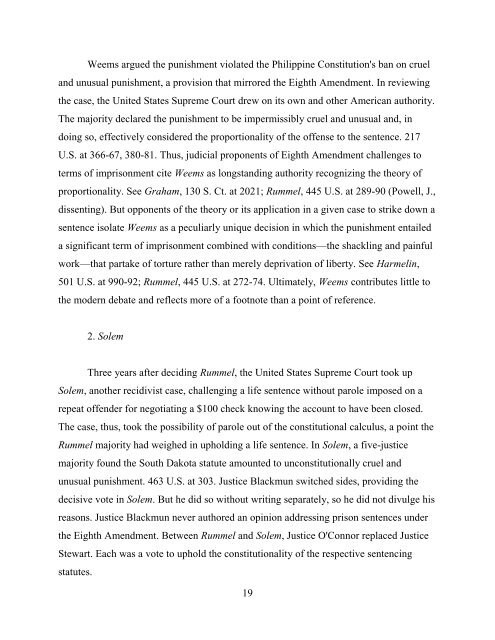State v. Proctor - Kansas Judicial Branch
State v. Proctor - Kansas Judicial Branch
State v. Proctor - Kansas Judicial Branch
Create successful ePaper yourself
Turn your PDF publications into a flip-book with our unique Google optimized e-Paper software.
Weems argued the punishment violated the Philippine Constitution's ban on cruel<br />
and unusual punishment, a provision that mirrored the Eighth Amendment. In reviewing<br />
the case, the United <strong>State</strong>s Supreme Court drew on its own and other American authority.<br />
The majority declared the punishment to be impermissibly cruel and unusual and, in<br />
doing so, effectively considered the proportionality of the offense to the sentence. 217<br />
U.S. at 366-67, 380-81. Thus, judicial proponents of Eighth Amendment challenges to<br />
terms of imprisonment cite Weems as longstanding authority recognizing the theory of<br />
proportionality. See Graham, 130 S. Ct. at 2021; Rummel, 445 U.S. at 289-90 (Powell, J.,<br />
dissenting). But opponents of the theory or its application in a given case to strike down a<br />
sentence isolate Weems as a peculiarly unique decision in which the punishment entailed<br />
a significant term of imprisonment combined with conditions—the shackling and painful<br />
work—that partake of torture rather than merely deprivation of liberty. See Harmelin,<br />
501 U.S. at 990-92; Rummel, 445 U.S. at 272-74. Ultimately, Weems contributes little to<br />
the modern debate and reflects more of a footnote than a point of reference.<br />
2. Solem<br />
Three years after deciding Rummel, the United <strong>State</strong>s Supreme Court took up<br />
Solem, another recidivist case, challenging a life sentence without parole imposed on a<br />
repeat offender for negotiating a $100 check knowing the account to have been closed.<br />
The case, thus, took the possibility of parole out of the constitutional calculus, a point the<br />
Rummel majority had weighed in upholding a life sentence. In Solem, a five-justice<br />
majority found the South Dakota statute amounted to unconstitutionally cruel and<br />
unusual punishment. 463 U.S. at 303. Justice Blackmun switched sides, providing the<br />
decisive vote in Solem. But he did so without writing separately, so he did not divulge his<br />
reasons. Justice Blackmun never authored an opinion addressing prison sentences under<br />
the Eighth Amendment. Between Rummel and Solem, Justice O'Connor replaced Justice<br />
Stewart. Each was a vote to uphold the constitutionality of the respective sentencing<br />
statutes.<br />
19

















